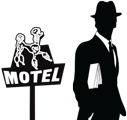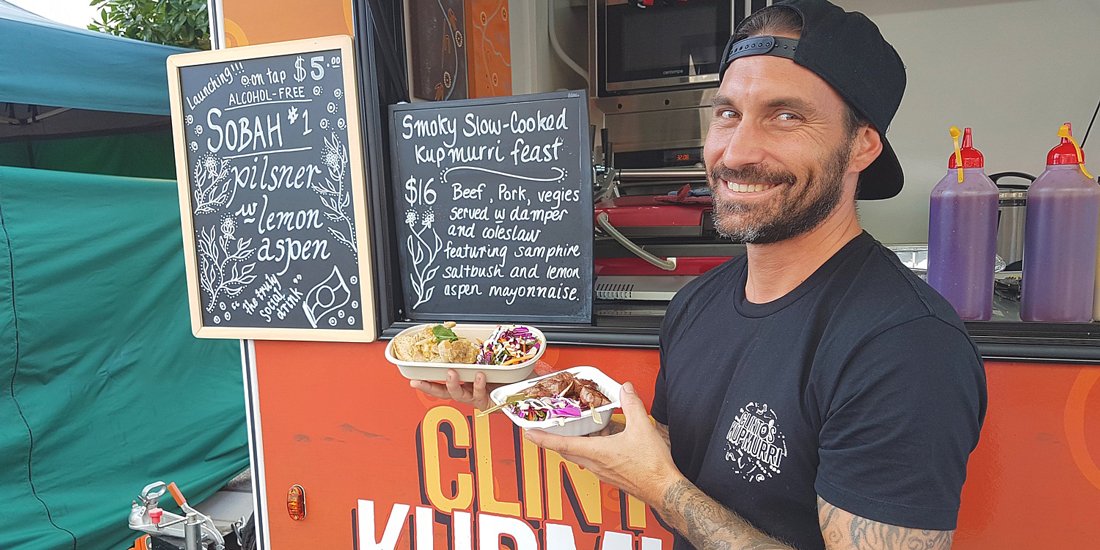Clinton Schultz, owner, Clinto's Kupmurri and Sobah
You are responsible for what you eat and what your young ones learn to eat ...
For Clinton Schultz of the Gamilaraay people, food is life. The local lad, who works as a health psychologist, is behind the Gold Coast’s first Aboriginal food truck, Clinto’s Kupmurri, which he brought to the streets after decades of working as a chef in top kitchens throughout Australia and Europe. With his wife Lozen by his side, the popular bush-tucker food truck has been turning heads throughout the region, showcasing the unique flavours and benefits of native Australian produce. The duo have also recently launched a range of non-alcoholic bush tucker-infused beer in a passionate bid to break down the culture of drinking in Australia. Fuelled by his culture and family, Clinton is paving his way through an industry that is heavily westernised to bring healthy native foods to the masses. It’s always a tough gig educating people, but Clinton is shifting attitudes and shining light on the health and sustainability benefits if native Australian produce, one bowl of ‘kupmurri’ at a time.
Let’s take things back a bit. What originally drove you to bring Aboriginal bush tucker to the streets?
In terms of Clinto’s Kupmurri, it was something that started many years ago. I’ve always been frustrated by the limited use of native produce here in Australia. I tried to use different bits and pieces throughout my earlier years as a chef but that was largely in upper class restaurants and predominately for a tourist market. More recently, I became frustrated at the lack of representation of authentic Australian food. International cuisine is very well represented in the food truck market. More and more I wanted to see our foods on menus and being accessible to everyday punters on the street. I thought if I was going to do it, it wasn’t going to be tokenistic. Native foods were going to be the hero ingredient, not just a garnish here or there. I also wanted people to know the many health and wellbeing benefits of these ingredients which is a great talking point. Cooking a ‘kup-murri’ or ‘kuppa-murri’ is an arduous process which I was doing for traditional health and wellbeing camps, and I wanted the convenience of a mobile kitchen. So began ‘Clinto’s Kupmurri’.
Tell us about the inspiration behind your latest venture Sobah, a native non-alcoholic beer?
Sobah non-alcoholic craft beer began over three years ago as a part of my journey to stop drinking alcohol. I used to drink quite heavily and, like many Australians, it wasn’t unusual to get overly intoxicated on weekends. I thought I was funny, but my behaviour wasn’t sending the right message to my children. It all came to ahead one Christmas Eve when I’d had too much and I upset my young children. My eldest son asked me to “stop drinking silly drink”. From that point on I stopped drinking alcohol in front of them. Over the next six months, I completely stopped drinking. It actually wasn’t hard, but going out with my mates become an issue. Not only was I joked at, but I still enjoyed the taste of beer and became frustrated that I could not get an adult tasting non-alcoholic drink anywhere I went. So I started playing around with non-alcoholic beers.
What do you hope that consumers take from Sobah?
Sobah is a way for us to help break down a few negative stereotypes while educating people. Sobah will change misperceptions about Aboriginal people being drunks, as statistically less Aboriginal people are likely to consume alcohol at all as compared to non-indigenous Australians. We also want to help all Australians understand that you don’t need to drink to socialise, to be happy or to have a good time. Through Sobah, we hope to intrigue people about Aboriginal languages, culture and bush tucker, which is demonstrated with the branding and can labels.
Who or what has been your biggest influence?
Over the past decade, hands down my wife and kids. Lozen has helped me learn to just be myself and to be comfortable with that. My kids have reinforced that being the real me is a much better me. Everyone around me influences me, it’s all about understanding that influence is always present but you get to choose what you do with it, good or bad. And what you choose, you have to own. No blame, no excuses. More directly though, a food truck from Darwin’s Mindil Beach Markets called ‘Roadkill Café’ inspired me to go down the food truck path. A story from a friend during a buck’s party in the wilderness of Aotearoa inspired me to remove alcohol from the family home, beginning the Sobah journey. A friend explained to us that the thing he found most inspirational in his father was the fact that he could not recall a time his father ever drank in front of him or was around him intoxicated. It really resonated with me.
How would you best describe your philosophy on food?
Food is life. Life is not food. You are responsible for what you eat and what your young ones learn to eat. Consume what you are comfortable with and given your circumstances make the best possible choices you can for you, your mob and your world. I know for many, choices seem scarce due to a range of food security issues but there is usually a more healthy and sustainable choice than what is directly obvious.
Tell us a little bit about your ‘day job’ as a health psychologist – what does your role entail?
I simply try to help people see their choices. Sometimes these can appear hard to see or to reach. I’m merely a guide. Individuals are the only experts on themselves and their circumstances, not so-called professionals. Through my consultancy, I travel A LOT! There aren’t too many Aboriginal psychologists around. I work mostly with organisations and their employees, or the peoples in their care. I run workshops, programs and cultural capacity training, and do a fair bit of work in community. Recently, my lecturing role at Bond Uni was made official so I’ll be found there more regularly as well.
Has that background played a role in your businesses Clinto’s Kupmurri and Sobah?
Absolutely! The importance of holistic health is promoted through all my businesses and endeavours. Also my keen interest in my own Gamilaroi culture has led me to try to live as well as I can. Hopefully through doing so I will help others to learn a bit more about positive living, which includes healthy eating and drinking habits.
With unique offerings like emu and crocodile on the menu at Clinto’s Kupmurri, you must get some customers that are a little taken back. How do you go about educating people on foods like this that aren’t entirely mainstream?
Most people find our menu strange or weird, and I have had a few that openly scoffed at it, pulling faces etc. That’s fine, that’s their choice, but it does tend to be a negative influence on others around at the time. I’ve got to a point in my life where I have all the time in the world for those that want to learn and I completely accept that not everyone is at that place at present. I give my time to those that want knowledge and to open themselves up to new experiences. It’s really not that unusual or weird, particularly for our mob.
What’s your earliest memory of food?
Learning to cook potato bake with my Nan, Evelyn. I actually don’t have much of a child hood memory but I do remember learning to cook for the family very young. Mum wasn’t one for cooking. By the time I was ten, I was well and truly put in charge of grocery shopping and cooking at home.
What’s the best piece of advice you’ve ever been given?
There’s no such thing as ‘perfect’ so stop trying to become it. I honestly learnt that from a grove of trees…
Finally, what inspires you?
It’s becoming more and more evident that European ways are not well suited to this country. Learning about the many tens of thousands of years’ knowledge on how to live well – physically, mentally and spiritually – with this beautiful place we call Australia is really exciting and the way forward for us all.

